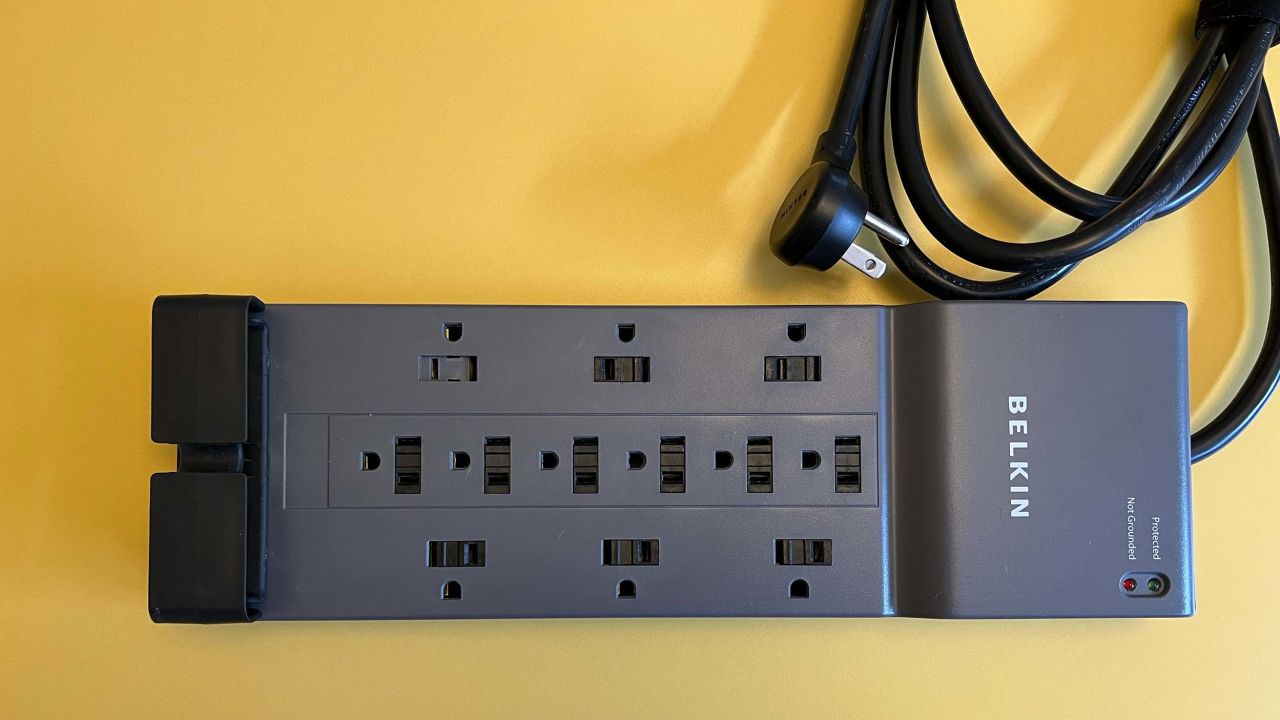Surge protectors are necessary for all electronics to prevent damage from electric surges. Protect your electronics with surge protectors.

Credit: www.cnn.com
Importance Of Surge Protectors
Surge protectors are essential for all electronics as they provide protection against power surges, preventing potential damage to your devices. Investing in surge protectors can save you money by avoiding costly repairs or replacements caused by electrical surges.
Surge protectors play a crucial role in safeguarding our electronic devices from power surges. Whether it’s your computer, television, or gaming console, these devices are prone to damage caused by sudden voltage spikes. Here’s why surge protectors are essential:
Protecting Electronics From Power Surges:
- Surge protectors act as a shield, preventing high voltage spikes from reaching your electronic devices.
- They redirect excess electrical energy to the grounding wire, keeping your devices safe.
- By absorbing the impact of power surges, surge protectors help extend the lifespan of your electronics.
How Surge Protectors Work:
- Surge protectors utilize metal oxide varistors (mov) or gas discharge arrestors (gdt) to redirect excess voltage.
- When a power surge occurs, these devices activate and divert the excess energy to the grounding wire.
- Surge protectors have multiple outlets to allow you to connect several devices simultaneously while providing surge protection to each one.
The Costly Consequences Of Not Using Surge Protectors:
- Without surge protectors, power surges can cause irreparable damage to your electronics.
- Repairing or replacing damaged devices can be expensive, especially if you have high-end equipment.
- Surge protectors offer a cost-effective solution, saving you money in the long run by preventing the need for costly repairs or replacements.
Investing in surge protectors is a prudent decision to protect your valuable electronics from potential power surges. These devices provide peace of mind by offering an added layer of security against unpredictable voltage spikes. Don’t wait until it’s too late – safeguard your electronic devices with surge protectors today!
Factors To Consider When Choosing Surge Protectors
Surge protectors are essential for protecting all electronics from potential damage caused by electrical surges. Factors to consider when choosing surge protectors include the number of outlets, joule rating, response time, and warranty.
Up quickly. Surge protectors act as a safeguard against power surges, ensuring that your valuable electronics stay protected from unexpected voltage spikes.
Understanding Surge Protection Ratings:
- Surge protectors have specific ratings that indicate their ability to handle power surges. The most common rating is called the “joules rating,” which represents the surge protector’s capacity to absorb energy from a power surge.
- Look for surge protectors with higher joules ratings as they provide better protection. A higher rating means the surge protector can handle larger power surges without being overwhelmed.
- It’s also important to consider the clamping voltage, which is the voltage level at which the surge protection kicks in. A lower clamping voltage indicates better protection against voltage spikes.
- Be sure to choose surge protectors that are certified by reputable organizations such as underwriters laboratories (ul) to ensure their safety and reliability.
Number Of Outlets And Connected Devices:
- Consider the number of outlets you need based on the number of devices you plan to connect to the surge protector. It’s always better to have a few extra outlets available for future expansion.
- Be mindful of the maximum load capacity of the surge protector to avoid overloading it with too many devices. Each surge protector has a maximum wattage or amperage limit, so make sure your connected devices don’t exceed that limit to ensure proper protection.
- If you have devices with large plugs or transformers, look for surge protectors with widely spaced outlets or rotating plugs to accommodate those bulky adapters.
Additional Features To Look For:
- Some surge protectors offer extra features that can enhance their functionality and convenience. Consider the following features while choosing a surge protector:
- Usb ports: Surge protectors with built-in usb ports allow you to charge your devices directly without needing additional adapters.
- Coaxial and telephone line protection: If you have devices such as cable boxes or landline phones, surge protectors with integrated coaxial and telephone line jacks can protect these connections as well.
- Led indicators: Surge protectors with led indicators provide visual alerts when they are properly grounded and protecting your devices.
- Emi/rfi filtering: Surge protectors with electromagnetic interference (emi) and radio frequency interference (rfi) filtering help reduce noise and interference for a cleaner power supply to your connected devices.
By considering these factors when choosing surge protectors, you can ensure that your electronics are well-protected from power surges. Remember to check the surge protector’s ratings, consider the number of outlets and connected devices, and look for additional features that suit your needs.
Taking these precautions will provide peace of mind and help prevent damage to your valuable electronics.
Common Misconceptions About Surge Protectors
Surge protectors are often misunderstood as being unnecessary for all electronics. However, they are crucial for safeguarding your devices from power surges that can cause damage and costly repairs. Invest in surge protectors to protect your valuable electronics.
Surge protectors play a vital role in safeguarding our valuable electronics from power surges. However, there are several common misconceptions surrounding surge protectors that often lead to confusion. Let’s address these misconceptions one by one:
Can Power Strips Be Used As Surge Protectors?
- Power strips and surge protectors serve different purposes. While power strips simply provide additional outlets, surge protectors offer protection against power surges.
- Power strips lack the necessary built-in components to absorb and redirect excess voltage during a power surge.
- Using a power strip as a surge protector can leave your devices vulnerable to damage during a sudden surge in electricity.
Surge Protectors Vs. Ups Systems
- Surge protectors and uninterruptible power supply (ups) systems are not the same.
- Surge protectors primarily protect against voltage spikes caused by power surges, while ups systems offer additional features such as battery backup to prevent data loss during power outages.
- Surge protectors are generally more affordable and suitable for everyday surge protection needs, while ups systems are essential for critical devices like servers or computer systems.
Surge Protectors As Fire Hazards: Myth Or Reality?
- There is a misconception that surge protectors can cause fires. However, this is often a result of misuse or failure to follow safety guidelines.
- Surge protectors should be used according to the manufacturer’s instructions and not overloaded with high-power devices.
- Choosing surge protectors with safety features like surge failure indicator lights and automatic shut-off can minimize the risk of fire hazards.
By dispelling these misconceptions, we can understand the importance of investing in proper surge protection for all our valuable electronics. Remember, surge protectors are a small price to pay for the peace of mind they provide in protecting our devices from costly damage and potential fire risks.
Frequently Asked Questions Of Are Surge Protectors Really Necessary For All Electronics?
Is Electronic Surge Protection Worth It?
Yes, electronic surge protection is worth it. Surge protectors help protect your valuable electronic devices from power surges caused by lightning strikes, power outages, or electrical malfunctions. Surge protectors contain built-in circuitry that detects and redirects excess voltage away from your electronics, preventing damage to sensitive components.
Without surge protection, a power surge can cause irreversible damage to your devices, leading to costly repairs or replacements. Investing in a surge protector is a small price to pay compared to the potential cost and inconvenience of replacing expensive electronics.
By using surge protectors, you can ensure the longevity and optimal performance of your electronic devices.
What Electronics Should Be Plugged Into A Surge Protector?
It is recommended to plug the following electronics into a surge protector: 1. Laptops and computers 2. Gaming systems 3. Televisions 4. Medical equipment 5. Routers and modems 6. Office equipment 7. Smartphones 8. Smart small appliances using surge protectors for these devices can help prevent damage caused by power surges, which can occur due to lightning strikes, power outages, or electrical issues.
Surge protectors are designed to absorb and redirect excess voltage away from your electronics, protecting them from potential harm. By plugging these devices into surge protectors, you can ensure their safety and longevity, as well as avoid costly repairs or replacements.
What Happens If I Don’T Use A Surge Protector?
Using a surge protector is essential to protect your electronic devices. Without a surge protector, your devices are vulnerable to electrical surges that can damage or destroy them. Electrical surges can occur due to power fluctuations, lightning strikes, or other unforeseen events.
A surge protector acts as a barrier by diverting excess voltage safely away from your devices and preventing any potential damage. It is especially important to use a surge protector for sensitive equipment like computers, televisions, gaming systems, and medical equipment, as they are more susceptible to damage from electrical surges.
By investing in a surge protector, you can provide an added layer of protection for your valuable electronics and avoid costly repairs or replacements in the event of a power surge.
Do You Really Need A Surge Protector?
Yes, surge protectors are necessary for all electronics. They provide protection against power surges or voltage spikes that can damage your electronic devices. Surge protectors act as a barrier between the power source and your devices, diverting excess voltage to the grounding wire.
This prevents the excess voltage from reaching your electronics and damaging them. Without a surge protector, your devices are left vulnerable to power fluctuations, which can lead to costly repairs or replacements. It is recommended to use surge protectors for all electronic equipment, including laptops, computers, gaming systems, televisions, routers, modems, and smart devices.
Investing in a surge protector can save you money in the long run by preventing damage to your valuable electronics.
Conclusion
Surge protectors play a crucial role in safeguarding our valuable electronics from unexpected power surges. Without surge protection, your devices are vulnerable to damage caused by voltage spikes. By investing in surge protectors, you can provide a reliable defense for all your electronic devices, including laptops, televisions, gaming systems, routers, and more.
Not only do surge protectors protect your electronics, but they also save you money in the long run. In the event of a power surge, the cost of repairing or replacing your electronic devices can quickly add up. Having a surge protection plan can help cover these costs and ultimately save you money.
Surge protectors are not just necessary but essential for all electronics, providing peace of mind and ensuring their longevity. So, don’t wait until it’s too late—get surge protectors for all your devices today.

